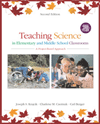 |  Teaching Children Science: A Project-Based Approach, 2/e Joe Krajcik,
University of Michigan - Ann Arbor
Charlene Czerniak,
University of Toledo
Carl Berger,
University of Michigan - Ann Arbor
How Do I Manage the Project-Based Science Classroom?
Web LinksTIMSS
(http://nces.ed.gov/TIMSS)
This is the home site for the Third International Mathematics and Science Study (TIMSS). This site provides the results of studies comparing the achievement of U.S. students in math and science to that of students in dozens of other countries. The first study was conducted in 1995, and a repeat study was conducted in 1999. |
Animal Supply Companies
| http://www.carolina.com
(http://www.carolina.com)
The Carolina Biological Supply Company supplies animals and specimens, as well as free software and audio and visual downloads for teachers. |  |  |  | http://www.nsta.org
(http://www.nsta.org)
Teachers can go to the Web site for the National Science Teachers Association (NSTA) to see lists of events relating to science teaching, find cross-links to relevant news stories, and order journals relating to science teaching. The site also has an on-line store through which teachers can order scientific materials. |
Safety Precautions
| Flinn Scientific
(http://www.flinnsci.com)
This is the home page for Flinn Scientific, Inc. Flinn provides resources for science teachers, makes suggestions for setting up labs, and offers solutions to science safety problems. |
 |  |  | American Red Cross
(http://www.redcross.org)
The home page for the American Red Cross provides biomedical services and health and safety services. |
Communicating Electronically with Peers
| National Science Teachers Association
(http://www.nsta.org)
Among the features of the NSTA home page is a discussion board where science teachers can communicate on a variety of topics. |  |  |  | hi-ce
(http://hi-ce.org)
This is the Web site for the Center for Highly Interactive Computing in Education. The site includes a Teacher Workroom through which instructors can communicate with one another. There is also an information center that provides contact information for hi-ce members. |  |  |  | WISE
(http://wise.berkeley.edu/welcome.php)
This is the home page for the Web-based Inquiry Science Environment (WISE). Students can use this free site to explore controversies in science. |
Other Web sites of interest for Chapter 10
| BrainPOP
(http://www.brainpop.com)
BrainPOP is the leading producer of animated, educational movies. The original movies explain numerous scientific concepts including the food chain. This is a fun, useful website for K-12 students because it addresses so many topics. |  |  |  | ECO-USA
(http://www.eco-usa.net)
This site focuses on the nation's environment. It contains information on specific environmental toxins including DDT, and also lists toxic waste sites in each state. |  |  |  | U.S. Environmental Protection Agency
(http://www.epa.gov)
This is the official website of the EPA. It contains publications and interactive activities concerning current events, pollution, and international problems. A kid's section and school adaptable programs are also available. |
|



 2003 McGraw-Hill Higher Education
2003 McGraw-Hill Higher Education